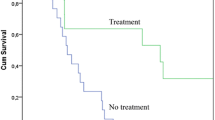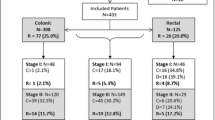Summary
Efficacy of the regular follow-up program and influence on survival rate following treatment of recurrence were evaluated. 556 follow-up records of patients after resection of colorectal cancer were analysed. The primary drop-out rate was 12.4%. Recurrences were found in 26.6% (n = 128). 53.1% of recurrences were symptomatic at diagnosis of recurrence. Curative resection of recurrence was only performed in 19.5%. 46.1% were given palliative and 34.4 no specific oncologic treatment. We define efficacy as the rate of curative asymptomatic recurrence. This was 3.5% of all patients. From the curative resection of recurrence only 6 patients were free of recurrence longer than 2 years. No second resection of recurrence was possible. Different treatment of recurrence did influence the survival rate (p = 0.09). There was no difference in prognosis for asymptomatic and symptomatic recurrences (p > 0.8). In order to increase the efficacy of follow-up for colorectal cancer we are introducing a new concept based on individual risk factors.
Zusammenfassung
Die Effektivität der standardisierten regelmäßigen Nachsorgeuntersuchungen und deren Einflu\ auf die Prognose nach R0-Resektion kolorektaler Karzinome wurde bei 556 Patienten untersucht, die seit 10 Jahren in der chirurgischen Tumornachsorge betreut wurden. Bei einer primären Ausfallrate von 12,4% zeigte sich eine Rezidivrate von 26,2% (n=128). Zum Zeitpunkt der Diagnose des Tumorrückfalls klagten bereits 53,1% über tumorassoziierte Beschwerden. Nur bei 19,5% aller Patienten mit einem Tumorrückfall konnte eine R0-Zweitresektion durchgeführt werden. Die Rate der asymptomatischen kurativ behandelten Patienten in der Nachsorge betrug 3,5%. Von den R0-Zweitresektionen waren nur 6 Patienten länger als 2 Jahre tumorfrei. Eine R0-Drittresektion war in keinem Fall möglich. Die Prognose der Patienten mit einem Tumorrückfall war nach R0-Zweitresektion besser als nach palliativer Therapie. Dieser Unterschied war aber nicht signifikant (p = 0,09). Die Prognose war nicht davon abhängig, ob der Tumorrückfall im asymptomatischen Zustand diagnostiziert wurde (p > 0,8). Zur Steigerung der Effektivität der Nachsorge kolorektaler Karzinome bezüglich der Entdeckung asymptomatischer kurabler Rezidive wird das Konzept der individuellen risikoadaptierten Nachsorge vorgestellt, das in Abhängigkeit von den individuellen Risikofaktoren der Patienten eine flexible Nachsorge durch einen onkologisch erfahrenen Chirurgen fordert.
Similar content being viewed by others
Literatur
Beart RW, O'Connell MJ (1983) Postoperativ follow-up of patients with carcinoma of the colon. Mayo Clin Proc 58:361
Beart RW, Metzger PP, O'Connell MJ, Schutt AJ (1981) Postoperative screening of patients with carcinoma of the colon. Dis Colon Rectum 24:585
Cochrane JPS, Williams JT, Faber RG, Slack WW (1980) Value of outpatient follow-up after curative surgery for carcinoma of the large bowel. Br Med J 280:593
Deveny KE, Lawrence WW (1984) Follow-up of patients with colorectal cancer. Am J Surg 148:717
Ekman CA, Gustavson J, Henning A (1977) Value of a follow-up study of recurrent carcinoma of the colon and rectum. Surg Gynocol Obstet 145:895
Enker WE, Kramer RG (1982) The follow-up of patients after definitive resections for large bowel cancer. World J Surg 6:578
Fortner JG (1988) Recurrence of colorectal cancer after hepatic resection. Am J Surg 155:378
Fritsch A, Herbst F, Schiessel R (1988) Das Lokalrezidiv nach kolorektalem Karzinom. Wien Med Wochenschr 13:313
Häring R, Karavias Th (1988) Das locoregionale Rezidiv nach Rectumresektion bzw. Rectumexstirpation. Chirurg 59:634
Hermanek P, Gall FP, Altendorf A (1982) Lokalrezidive nach Rectumearcinom — Entstehung, Diagnose, Prognose. Langenbecks Arch Chir 356:289
Hohenberger P, Schlag P, Kretschmar U, Herfarth Ch (1991) Das regionäre Lymphknotenrezidiv beim colorectalen Carcinom. Chirurg 61:110
Hulton NR, Hargreaves AW (1989) Is long-term follow-up of all colorectal cancer necessary? J R Coll Surg Edinburgh 34:21
Isbister WH (1988) The follow-up of patients following surgery for colorectal cancer — a personal view. Ann Acad Med 17:66
Langevin JM, Wong DW (1985) What is appropriate follow-up for the patient with colorectal cancer? Can J Sur 28:424
Northover JMA (1991) What is the optimal follow-up for colon cancer? (Colorectal disease). The Cleveland Clinic Foundation, Ft. Lauderdale, Florida
Mentges B (1988) Kontroversen in der Nachsorge des Kolonkarzinoms. Zentralbl Chir 113:1087
Mentges B, Brückner R (1988) Prognostische Kriterien und Risikogruppen beim kolorektalen Karzinom. Wien Med Wochenschr 13:317
Mentges B, Stahlschmidt M, Brückner R (1987) Die Effektivität der Nachsorge beim Coloncarcinom. Langenbecks Arch Chir 370:223
Mentges B, Mentges W, Grifner R, Brückner R (1988) Art und Prognose des lokoregionären Rezidivs beim Rektumkarzinom. Dtsch Med Wochenschr 113:806
Metzger U, Bronz K, Bühler H et al. (1985) Die prospektive Nachsorgestudie radikal operierter kolorektaler Karzinom. Schweiz Med Wochenschr 115:1001
Minton JP, Johen JL, Gerber DM et al. (1985) Results of a 400-patient carcinoembryonic antigen second-look colorectal cancer study. Cancer 55:1284
Ovaska JT, Järvinen H, Mecklin JP (1989) The value of a follow-up programme after radical surgery for colorectal carcinoma. Scand J Gastroenterol 24:416
Ovaska TJ, Järvinen H, Perttilä I, Mecklin JP (1990) Follow-up of patients operated on for colorectal carcinoma. Am J Surg 159:593
Quentmeier A, Schlag P, Herfarth Ch (1986) Schlüsselrolle des CEA-Testes für die Diagnostik und chirurgische Therapie des rezidivierenden colorectalen Carcinoms. Chirurg 57:83
Schiessel R, Wenzl E (1988) Was bringt die Nachsorge beim kolorektalen Karzinom? Wien Med Wochenschr 11:263
Schiessel R, Wunderlich M, Herbst F (1986) Local recurrence of colorectal cancer: effect of early detection and aggressive surgery. Br J Surg 73:342
Schildberg FW (1987) Probleme des Lokalrezidivs nach colorectalem Carcinom. Langenbecks Arch Chir 372:505
Secco GB, Fardelli R, Campora E et al (1989) Factors influencing local recurrence after curative surgery for rectal cancer. Oncology 46:10
Secco GB, Fardelli R, Campora E et al. (1990) Ergebnisse einer postoperativen Nachuntersuchung versus keine Nachuntersuchung bei kolorektalen Karzinomen. Coloproctology 12:364
Stock W (1979) Nachsorge beim kolorektalen Karzinom. Springer, Berlin Heidelberg New York
Stock W (1981) Bedeutung der Nachsorge beim kolorektalen Karzinom. Münch Med Wochenschr 44:1657
Sugarbaker PH, Gianola FJ, Dwyer A, Neuman NR (1987) A simplified plan for follow-up of patients with colon and rectal cancer supported by prospective studies of laboratory and radiologic test results. Surgery 102:79
Törnquist A, Ekelund G, Leandoer L (1982) The value of intensive follow-up after curative resection for colorectal carcinoma. Br J Surg 69:725
UICC (1987) TNM-Klassifikation maligner Tumoren, 4. Aufl. Springer, Berlin Heidelberg New York
Wagner G (1988) Tumorlokalisationsschlüssel. International Classification of Diseases for Oncology (ICD-O), 3. Aufl. Springer, Berlin Heidelberg New York
Author information
Authors and Affiliations
Additional information
Enthält Ergebnisse der Dissertationen von K. Turowski und U. Rösch
Rights and permissions
About this article
Cite this article
Böhm, B., Oßwald, J., Hucke, H.P. et al. Individuelle risikoadaptierte Nachsorge beim kolorektalen Karzinom?. Langenbecks Arch Chir 376, 314–322 (1991). https://doi.org/10.1007/BF00186422
Received:
Published:
Issue Date:
DOI: https://doi.org/10.1007/BF00186422




